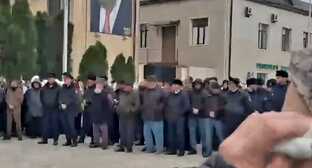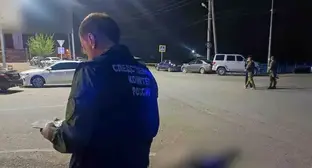20 May 2003, 13:47
Shaumyan, Stepan Grigoryevich
Revolutionary and politician.
Born October 1, 1878, in the city of Tiflis, in a family of a salesman. In 1898-1902, studied in St. Petersburg and Riga Polytechnic Institutes. In 1905, graduated from Philosophy Department of Berlin University. Was a member of RSDRP (Russian Social Democrat Workers' Party) since 1900. In 1902, was one of the organizers of Armenia's first Marxist organization Union of Armenian Social Democrats. After RSDRP's second congress in 1903, was a Bolshevik. In 1905-1911, was a member of Caucasian Union Committee of RSDRP. Was a member of the Revolution of 1905-1907 in Tiflis and Baku. Was a delegated of the Fourth (1906) and the Fifth (1907) congresses of RSDRP. Was repeatedly arrested, served a term in exile. At the Sixth all-Russian RSDRP's conference in Prague in 1912, was elected a candidate for the cooptation to the members of the Central Committee in absentia, because was in exile. Contributed to the Bolshevik newspaper Pravda. In 1915-1916, was a member of the Caucasian Bureau of RSDRP. Combined revolutionary activities with literature and critiquing; authored articles defining the Bolsheviks' program theses on the nationality issue.
After the February revolution of 1917, returned to Baku on March 7 from an exile. Since April, was an editor of the newspaper Bakinsky Rabochy (Baku's Worker), the printed organ of Baku Committee of RSDRP, and the newspaper Kavkazsky Rabochy (Caucasian Worker) of Tiflis. Authored multiple articles propagating Bolshevik line in the revolution, dismantling the policies of the Interim Government and bourgeois nationalism. Since May 11, 1917, was a leader of the Bolshevik faction in the Baku Council of the Workers' and Military Deputies; was one of the leaders of Baku Committee of the united RSDRP. Was a delegate of the First all-Russian Congress of the Soviets on June 3 thru 24, 1917, where he announced on behalf of the Bolshevik faction on June 12 the resolution, in which there were stated the claims for the peace with no annexations and contributions and a right of "every nation to determine independently and freely its union with a certain state or to proclaim its own independent state" (quoted by: The First Congress of the Soviets, vol. 2, p. 17). At the Congress, was elected a member of the All-Russian Central Executive Committee. On June 25, was elected in absentia a member of Baku Committee of the united RSDRP.
In the months to follow, paid much attention to the work in the newspaper Bakinsky Rabochy that propagated proletarian internationalism, which was especially important for the unity of the multi-national Baku workers and all Caucasian working class. On July 6, in the article Caucasian Nationalists and Social Democracy published in this newspaper, urged the Bolsheviks to conduct a consistent struggle against the nationalistic propaganda, stated it necessary for the social democrats to sharply and definitely isolate themselves from nationalism. After the July events in Petrograd in 1917, published a number of articles refuting the calumny of Bolsheviks as German imperialism's agents and dismantling the policies of Mensheviks and social revolutionaries. On August 5, was elected a member of the close circle of the Central Committee of RSDRP(b). Was one of the creators of the Youth Organization of Baku Committee of RSDRP(b), named International Union of Working Youth of Baku and Vicinity since January 1918.
On September 1917, participated in the meeting of the party's Central Committee, where V.I. Lenin's letters on the necessity of an armed rebellion were discussed; supported Lenin's plan of the revolution's development. Was a participant of the Democratic Meeting on September 14 thru 22, 1917.
From October thru 7, 1917, was one of the leaders of the Caucasian Regional Congress of RSDRP(b); presented a report On the Current Moment. During the debate on M. Toroshelidze's report on the national issue, declined the reporter's basic claims on "general Caucasian local administration" and supported the idea of the regions' autonomies suggesting to divide Transcaucasia into three regions. Was elected a member of the Caucasian Regional Committee of RSDRP(b). Since October 13, 1917, was a chairman of the Interim Executive Committee of the Baku Council, which adopted a resolution on October 15 to transfer all power to the Soviet. Was elected a delegate of the Second All-Russian Congress of Workers' and Soldiers' Deputies in absentia; was not present at the congress due to a complicated situation in Baku.
On October 26, 1917, at the meeting of the Interim Executive Committee of the Baku Council, Shaumyan welcomed the victory of the armed rebellion in Petrograd, but the majority comprised of Mensheviks and Esers denounced it. On October 31, at Shaumyan's initiative, at the enlarged session, the Baku Council proclaimed itself the local legitimate revolutionary legislative body, welcome the victory of the rebellion in Petrograd, and adopted a resolution of recognition of the power of the People's Commissars' Council of Russian Republic. Shaumyan was elected the chairman of the Executive Committee of the Baku Council of the Workers' and Soldiers' Deputies. In November, was elected a member of the Constituent Assembly from Transcaucasia. Since November 22, participating in the meetings of the Caucasian Regional Committee of RSDRP(b), tried unsuccessfully to convince the members of the Regional Committee of the necessity of mobilizing the Transcaucasian proletariat and conducting a resolute struggle against the Transcaucasian anti-Soviet coalition basing on the revolutionary troops of the Caucasian front.
On December 16, 1917, the People's Commissars' Council of RSFSR (Russian Soviet Federative Socialist Republic) appointed S.G. Shaumyan an Interim Extraordinary Commissar for the Caucasus Affairs. On January 25, 1918, at the meeting of the workers of the Principal Workshops of the Transcaucasian Railroad in Tiflis, Shaumyan voiced a protest to the Transcaucasian Commissariat regarding the disarmament and shooting of the Caucasian Front Russian troops at Shamkhor, near Elizavetpole. On the same day, the Transcaucasian Commissariat offered Shaumyan an option to leave Transcaucasia within 24 hours and simultaneously issued a warrant for his arrest. Shaumyan became illegal.
On March 5, 1918, together with the troop trains going to Russia, Shaumyan returned to Baku and headed the proletariat's fight for the strengthening of the Soviet power and against separating Transcaucasia from Soviet Russia. Since April 25, 1918, was a chairman of the People's Commissars' Council of Baku Commune and External Affairs Commissar.
After the overthrow of the Soviet power in Baku on July 31, 1918, together with other Baku Commissars, attempted the evacuation of Soviet armed troops by sea to Astrakhan, but the ships were captured on August 16 by the military vessels of Centrocaspian anti-Soviet dictatorship. Shaumyan and his brothers-in-arms were arrested and placed in Baku prison. On August 28, Shaumyan and other Baku Commissars were elected in absentia the members of Baku Council. On September 14, Shaumyan and his comrades were liberated by a group of Bolsheviks headed by A.I. Mikoyan and left for the sea on a steamboat. The steamboat's crew led the vessel to Krasnovodsk, where 26 Baku Commissars were arrested. On the night of September 20, Baku Commissars were shot at the decree of the English Military Mission and representatives of the anti-Bolshevik Transcaucasian Interim Government between the stations of Pereval and Akhcha-Kuyma of Transcaucasian Railroad.





Комментирование через Кавказский узел